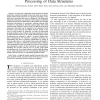49 search results - page 2 / 10 » Connectionist Models for Formal Knowledge Adaptation |
AH
2008
Springer
13 years 11 months ago
2008
Springer
The focus of my thesis is on the development of a multi-method framework for the validation of formal models (domain model, user model, and teaching model) for adaptive work-integr...
IJCAI
2007
13 years 6 months ago
2007
Computational cognitive modeling has recently emerged as one of the hottest issues in the AI area. Both symbolic approaches and connectionist approaches present their merits and d...
TNN
1998
13 years 4 months ago
1998
—A structured organization of information is typically required by symbolic processing. On the other hand, most connectionist models assume that data are organized according to r...
TYPES
2004
Springer
13 years 10 months ago
2004
Springer
Abstract. Most approaches to the formal analysis of cryptography protocols make the perfect cryptographic assumption, which entails for example that there is no way to obtain knowl...
ATAL
2010
Springer
13 years 5 months ago
2010
Springer
One of the most challenging aspects of reasoning, planning, and acting in a multi-agent domain is reasoning about what the agents know about the knowledge of their fellows, and to...

